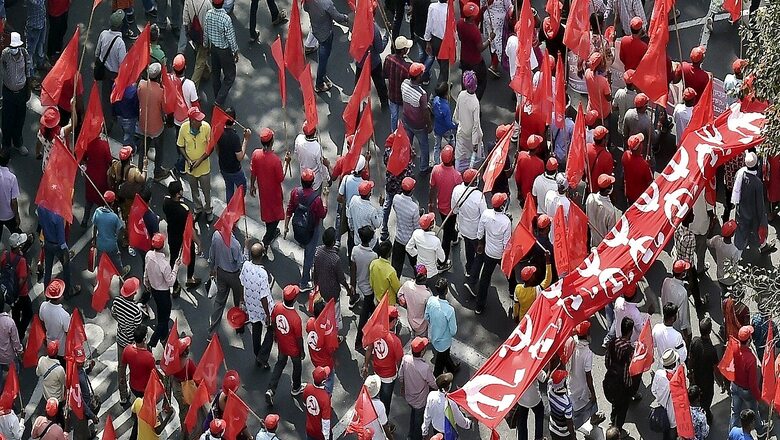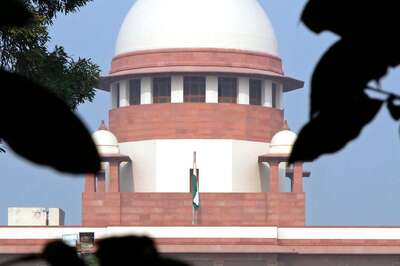
views
As West Bengal’s relay race enters its last lap, the joust acquired an interesting dimension. So far, the narrative was dominated by the BJP-Trinamool Congress (TMC) battle. The Left Front (LF) and the Congress were virtually out of the main frame, despite the LF ruling West Bengal for over 30 years. In the last three rounds, however, the LF and Congress, that sealed an alliance, have come into play because several constituencies voting in north and south Bengal have a significant Muslim electorate that remained loyal to the duo even as recent as the 2019 Lok Sabha polls. But the alliance got traction with a third angle etched by the Indian Secular Front (ISF) that sprang up a month before the elections.
The incipient ISF emerged as a crucial component of the self-christened “Third Front”, the declared intent of which was to first vanquish the TMC before confronting the BJP. The targets were set by the CPI(M), that helms the Left Front. Apparently, it has not forgiven the TMC and its chief Mamata Banerjee for reducing it to dust in the 2016 Assembly election. By a strange logic, Left Front leaders believe that Mamata’s ouster and the BJP’s ascendancy will pave the way for its revival by the next elections. In one stroke, the CPI(M)’s presumption demolished the salience of “secularism” as a bond that might tie the Opposition together to challenge the BJP in 2024. For the CPI(M), expediency overruled every other consideration, while the Congress—that was irrelevant in West Bengal for decades—was content this time piggy-backing on the Left Front.
The Left’s long-standing “conviction” in secularism was repudiated the day it roped in the Indian Secular Front (ISF) in the “third front”. By according primacy to the ISF at the cost of displeasing Left Front constituents like the Forward Bloc, the CPI(M) overtly and unabashedly played vote-bank politics which, for years, it camouflaged under politically kosher feint, only to settle scores with Mamata Banerjee.
The ‘Secular’ ISF & Abbas Siddiqui
The ISF was founded by Abbasuddin Siddiqui, the 34-year-old “pirzada” (cleric) of the Furfura Sharif shrine that wields considerable clout among Muslims in the south Bengal districts and parts of the north. Abbas Siddiqui was initially in talks with the All India Majlis-e-Ittehadul Muslimeen (AIMIM) but called them off once the CPI (M) softened him up. The AIMIM was a no-no for the Left because its leader, Asaduddin Owaisi, was perceived as a “hardliner”.
But what of the record of Siddiqui, popularly known as “bhaijaan”? He infamously traduced the TMC’s Basirhat MP and actor, Nusrat Jahan, for “earning money by selling the body”. Siddiqui’s inference was “it means such persons (like Nusrat) can also sell the country.” During the 2020 communal violence in Delhi, he warned that Allah would send a virus to India to kill crores. A reminder of Siddiqui’s incendiary statements was brushed aside by the CPI(M) with a pat, “but he’s changing” answer. Mohammed Salim, the party’s politburo member, claimed Siddiqui’s outfit was created not just to fight for Muslims but also Adivasis and Dalits. As the BJP carved out a large space for identity politics by working on the Adivasis, the Dalits and the more backward castes and inducing among them a sense of “empowerment”, the ISF gave away tickets to “subaltern” Hindus, ostensibly to repair its sectarian image.
The CPI(M) handed 30 of the 294 Assembly seats to the incipient ISF, more than what the Left Front constituents got. To reinforce the ISF’s importance, Siddiqui was accorded primacy in the “third front’s” launch rally at Kolkata’s Brigade Grounds on February 28. The star speaker, who purportedly galvanised the bulk of the massive turnout (itself a reflection on the Left Front’s dwindling ground strength), arrived appropriately late but once he did, Congress MP Adhir Ranjan Chowdhury, who was addressing the gathering, had to abort his speech because the air was rent with applause and slogans for Siddiqui.
That the front was a less-than-perfect combine became evident when the Forward Bloc refused to attend the rally, the West Bengal Congress privately cribbed about the number of seats the ISF wangled and senior Congressman Anand Sharma said the alliance militated against the party’s “core ideology founded on Gandhian and Nehruvian secularism”.
The Tag of Appeasement Politics
More to the point, did Mamata Banerjee watch the developments from the sidelines? No way. On the day the “third front” staged its inaugural meeting, the West Bengal government announced a development grant of Rs 2.6 crore for the Furfura shrine. Abbasuddin’s uncle, Toha Siddiqui, invited Mamata to a festival at the shrine, and Pir Qutubuddin Siddiqui, the oldest of the surviving descendants of Pir Abu Bakr Siddiqui, believed to be the 31st descendant of Khalifa Aboobacker, the first Caliph of the Rashidun Caliphate, pledged support to the TMC in leaflets that were widely circulated among the Muslims.
The Left Front’s CV is bound to show up indefensible inadequacies in its conduct and policies towards the Muslims who, as per the 2011 census, constituted 27 per cent of West Bengal’s population. The 2006 Sachar Committee report placed the state in the “worst performer category” and was regarded by the Muslim clergy as an “eye-opener” for the community that steadfastly stood with the Left Front government. The report worked to the TMC’s advantage in the 2011 polls.
Siddiqui is campaigning hard against Mamata’s “inability” to deliver anything “substantial” to the Muslims but observers believe that if the “third front” dents her minority following, it will be on account of the Congress-Left’s traditional pockets of influence that might be enhanced by the ISF as in the 12 Assembly seats of Malda. Malda was the stronghold of the late Congressman Abu Barkat Ghani Khan Choudhury and remained so loyal to his memory that it voted out his niece, Mausam Noor, from Malda North for joining the TMC before the 2019 polls. On the other hand, Ghani Khan Chowdhury’s brother, Abu Hasem Khan Chowdhury, who remained in the Congress, won from Malda South.
The CPI(M)’s tryst with the ISF might or might not pay off but the party’s history of “appeasement politics” is revealing. The Buddhadeb Bhattacharjee dispensation in 2003 had banned Taslima Nasreen’s novel “Dwikhondito”. Such actions raise the questions on whether the alliance with the ISF becomes “secular” because of the CPI(M)’s presence or will the CPI(M) have to live with the label of “appeasement” politics that it accused the TMC of?
Additionally, the CPI(M) finds it hard to defend the perception that it has a “covert” understanding with the BJP in the ongoing elections. Like the BJP, it held Mamata culpable for the recent Sitalkuchi violence. Again, it endorsed the BJP’s demand to not club the last three rounds of polling into one because of the pandemic. It’s a legacy that sits uneasy on the CPI(M).
Read all the Latest News, Breaking News and Coronavirus News here. Follow us on Facebook, Twitter and Telegram.




















Comments
0 comment